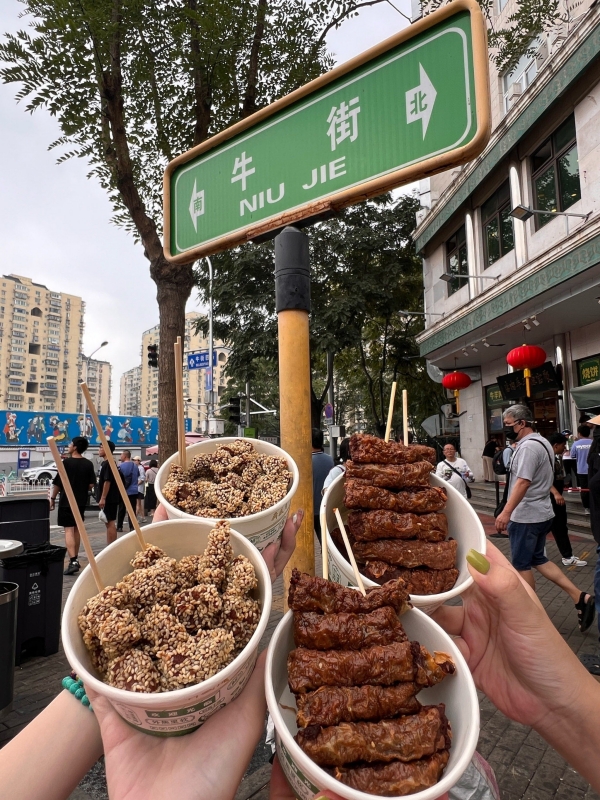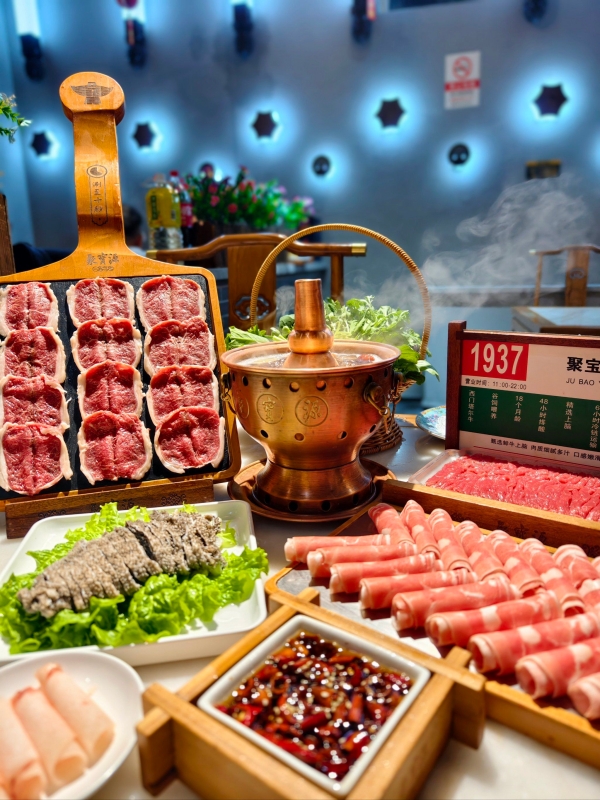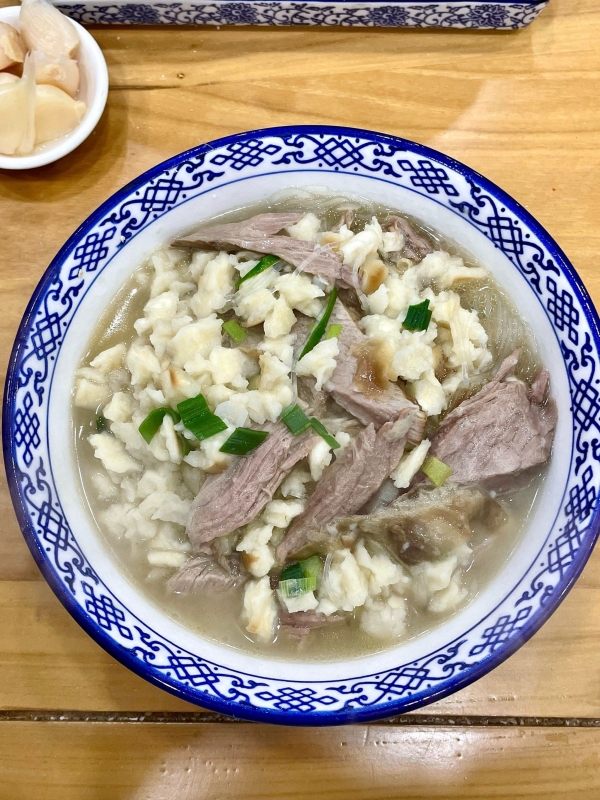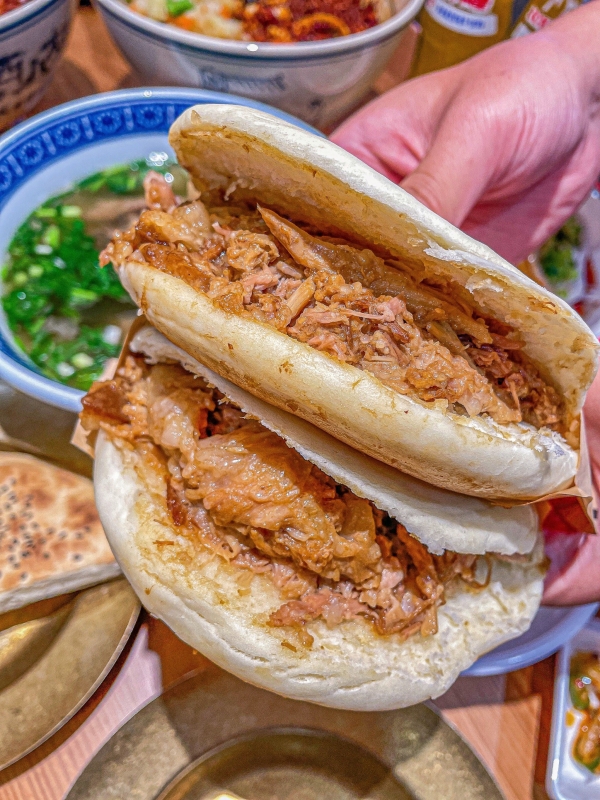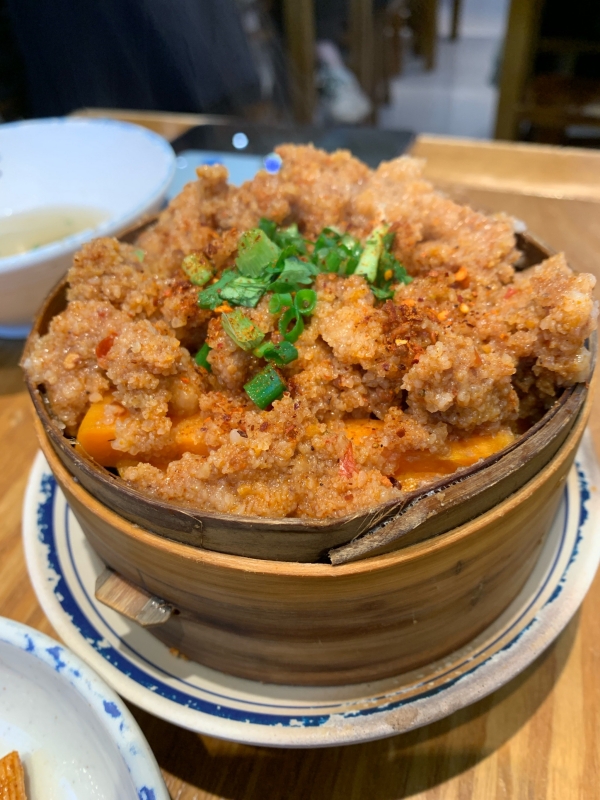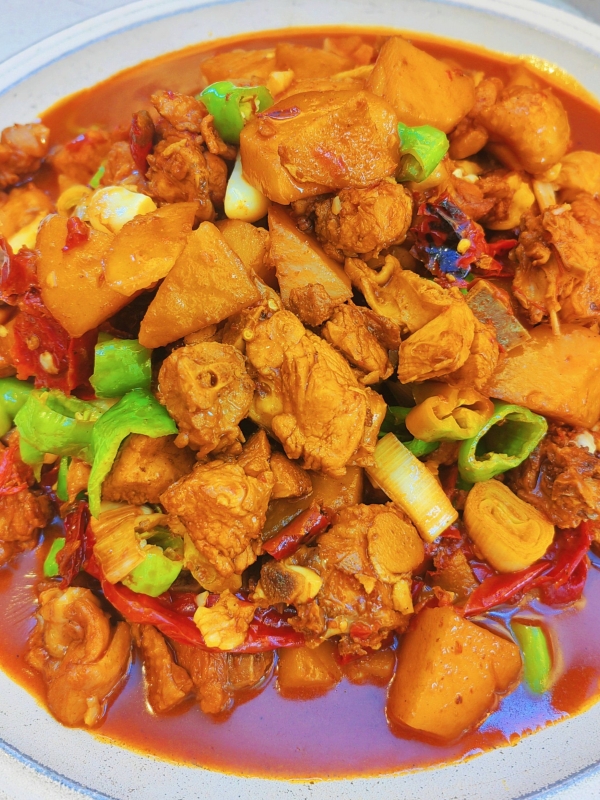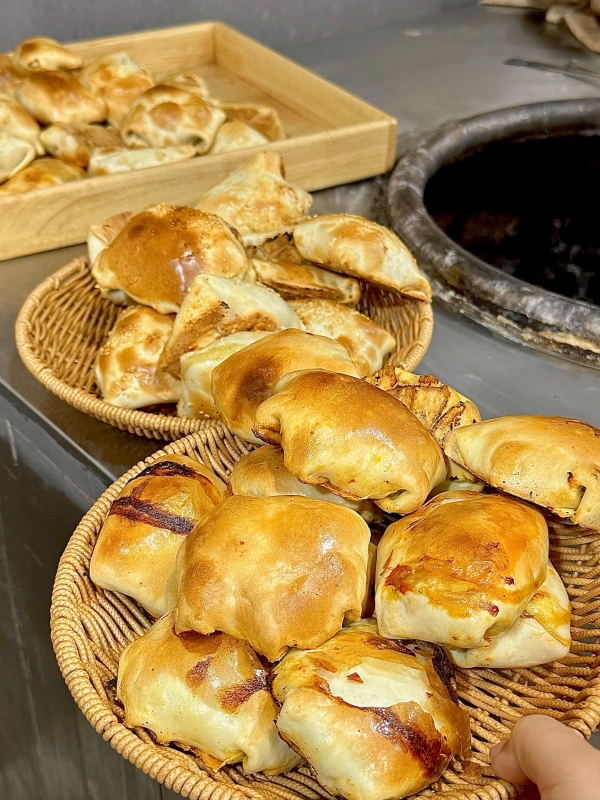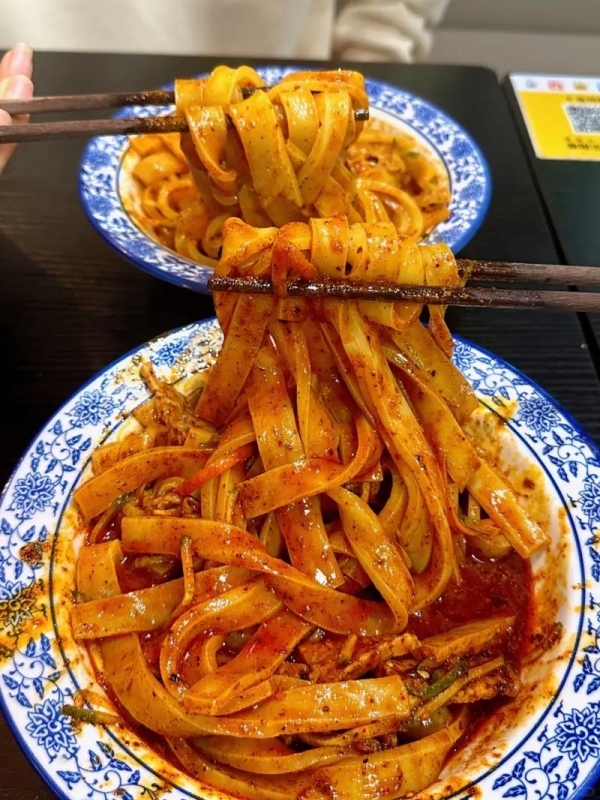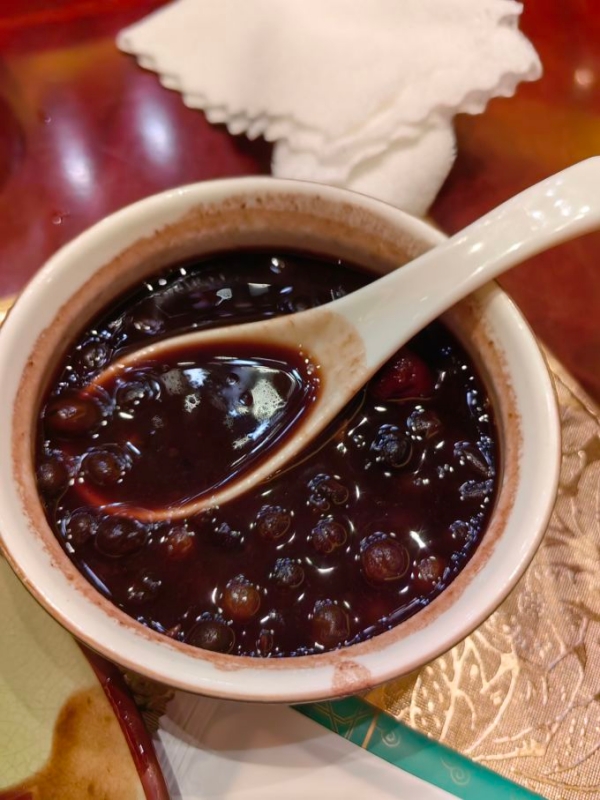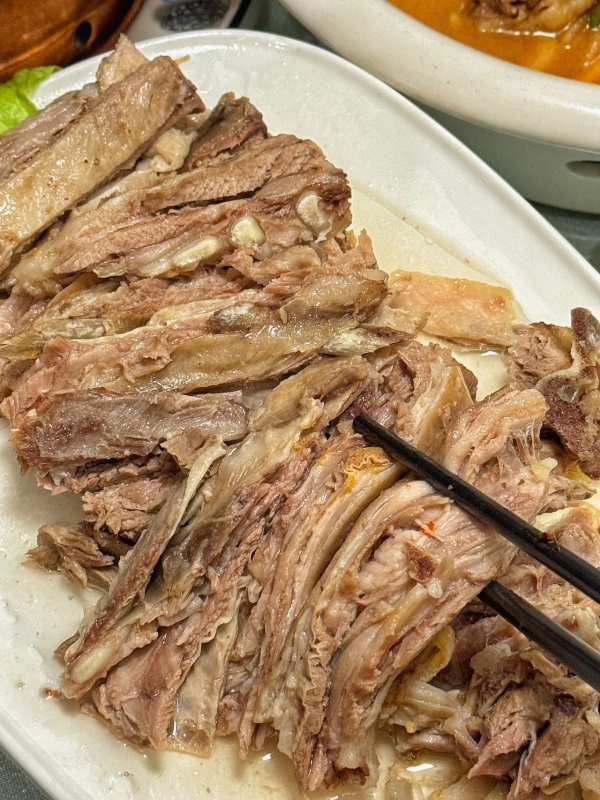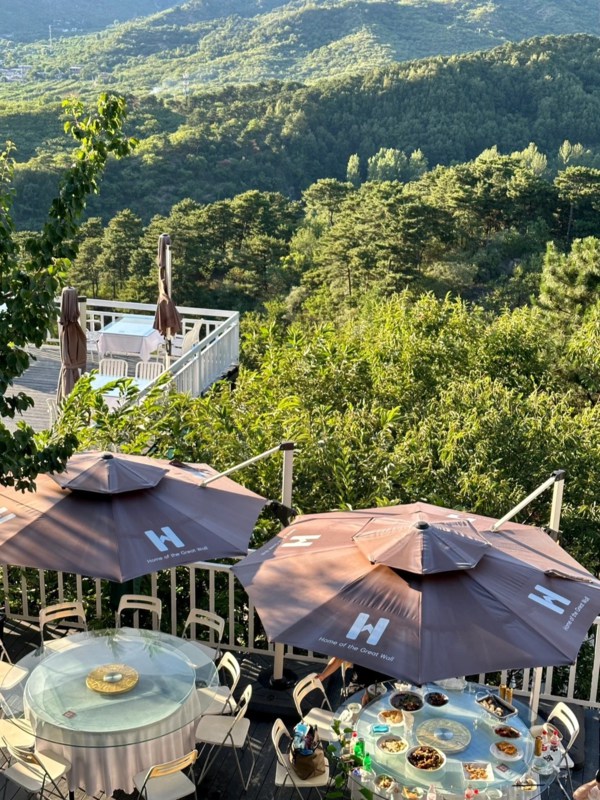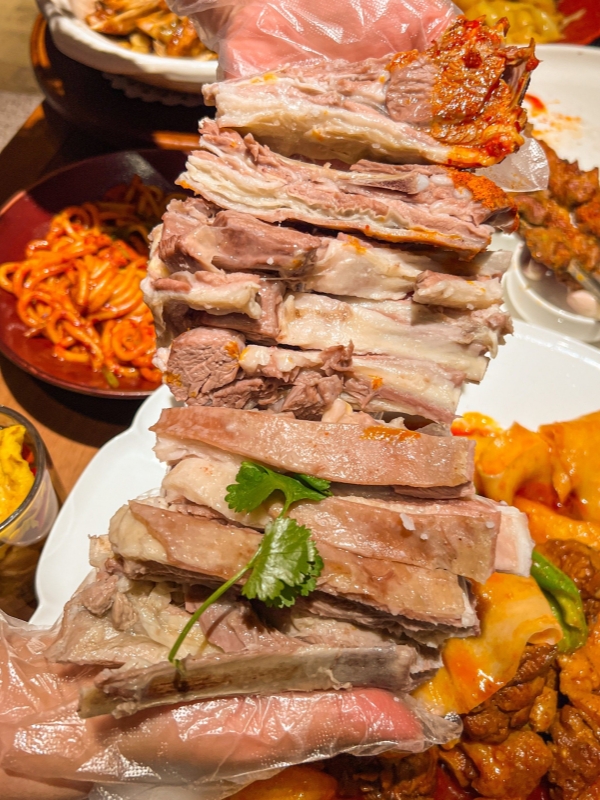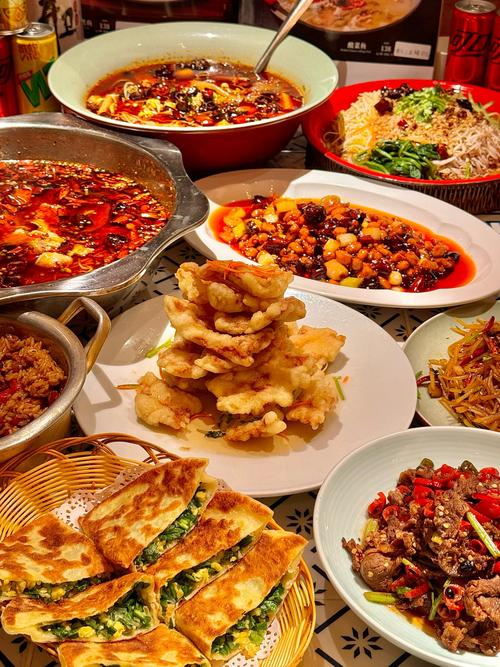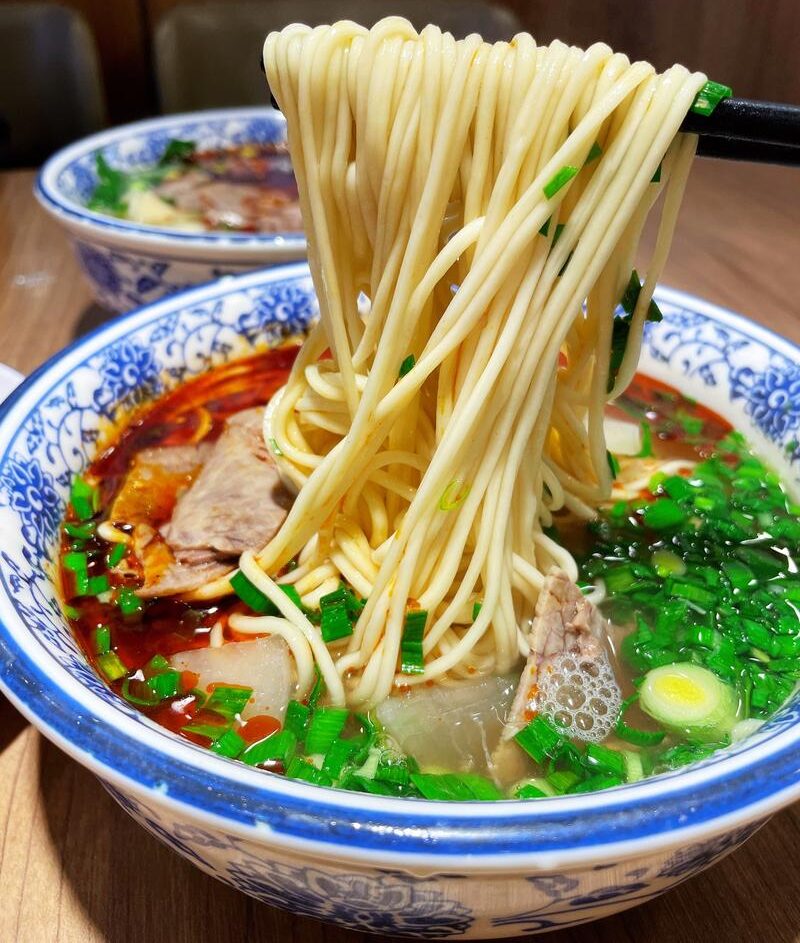
Lanzhou Lamian
China houses over 30 million Muslims—including Hui, Uyghur, and other ethnic groups whose presence has helped create the nation’s food landscape for more than a thousand years. Their culinary traditions did not arise in some sort of contemporary renaissance effort, but rather as an unbroken thread tying together religious devotion, social atmosphere, and nutrition for daily needs. For many centuries, halal food in China existed in the realm of discipline and sincerity, with the systems of certifying the food, the active markets, and the operating techniques to preserve its purity from Beijing to Kashgar as its supports.
For visitors to China wondering about halal food, the cities themselves provide the answer, not the remote regions. Halal food is incorporated into urban life, in quite busy streets, restaurants run by families, and old-fashioned quarters with the echoes of a million years of Muslim life in them. This guide goes through the major cities of China one by one, from the old capitals to the modern commercial cities, and shows the way halal good lives in the local circumstances and where halal restaurants and certified stores are to be found.
The Historical and Cultural Foundations of Muslim and Halal Traditions in China
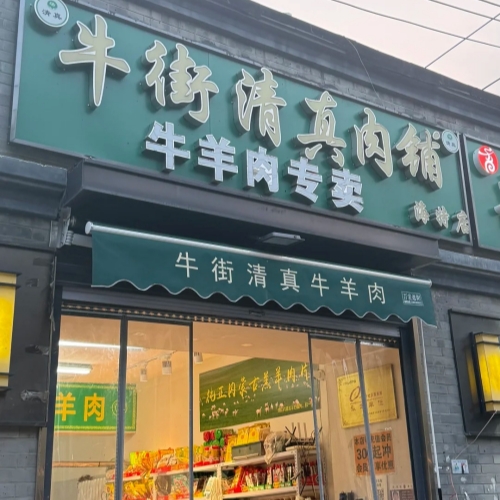
Niujie Butcher Shops
China’s Muslim culture carries a history that blends faith, community, and daily life. The presence of Islam dates back to the Tang Dynasty (7th century), when Arab and Persian merchants introduced their beliefs and traditions through the Silk Road. Over the centuries, Chinese Muslims have preserved their religious identity while contributing richly to the nation’s cultural and culinary heritage. Today, more than 30 million Muslims—primarily Hui, Uyghur, and other ethnic groups—live across the country, forming a vital part of China’s social fabric.
| 🕌 Muslim Group | 🧭 Region & Population | 🍜 Cuisine Highlights | ✨ Cultural Notes |
|---|---|---|---|
| Hui Muslims | Nationwide • 10.5M | Hand-pulled noodles, slow-cooked beef soup, lamb stir-fry | Blend into Chinese neighborhoods; key bridge for Halal Food in China |
| Uyghur Muslims | Xinjiang • 12M | Naan bread, polo rice, cumin lamb | Central Asian flavors; colorful décor with Islamic art; major influence on Halal Food in China |
| Dongxiang, Salar, Kazakh | Northwest China • smaller populations | Lamb stews, grilled meats, dairy-based dishes | Add regional diversity to Halal Food in China, though restaurants are rarer |
This table offers a concise glimpse into the major Muslim communities in China, each shaping the nation’s halal food culture in distinctive ways. From here, we’ll journey through different regions together, uncovering how halal traditions take root in local kitchens and markets—and how faith continues to shape the rhythm of daily life, one city at a time.
Respect goes a long way in halal restaurants — and knowing 21 Things to Not Do in China will help you blend in gracefully.
Halal Food in Beijing - The Imperial Capital's Flavor Legacy
- Niujie Muslim Quarter
- Jubao Yuan (聚宝源)
- Men Ding Rou Bing (门钉肉饼)
Beijing stands as a surprising halal food gem beyond China's northwest. Beyond its ancient landmarks, the city boasts 12 major mosques and over 300 halal restaurants, a legacy dating back to the Yuan Dynasty (1271-1368) when it served Muslim traders. This long-standing history has cultivated a diverse and authentic halal culinary scene that rivals many regional hubs.
Niujie Muslim Quarter - Beijing's Halal Heartland
Location: Xicheng District, south of Tiananmen Square Metro: Line 7, Niujie Station, Exit A Average Meal Cost: ¥30-60 Best Time to Visit: 11am-2pm (lunch) or 7pm-9pm (dinner)
Stepping out of Niujie Metro Station, your nose will feast on the delightful aromas of grilled lamb meat with cumin, fresh sesame buns, and beef soup that has been simmering for hours. Along this 1km strip, you will find over 80 halal eating stalls—a real food lovers paradise. In a week-long stay, it is easy to sample more than 20 different types of food in this area.
Tips for Niujie: Avoid Sundays 12pm – 3pm, unless you want to queue for 2 hours. Best time is before 11am or after 2pm. Take cash for the small vendors (although Alipay / Wechat Pay are widely accepted). Try the sesame cakes (麻酱烧饼, ¥3-5) from Jubao Yuan, very crispy, with a deep, sesame aroma. Delicious served with hotpot.
Can't-Miss Restaurants & Eats
- Jubao Yuan (聚宝源): A legendary lamb hot pot (涮羊肉) restaurant for over 30 years! And for ¥68 per person! It is such excellent quality that there are long queues to be served on weekends. To avoid this, go there on weekdays at approximately 11.30am and you can sit down quickly. Their lamb spine hot pot (羊蝎子火锅 , ¥58-88) is another highlight. Interesting. Lamb spines are slowly cooked in spicy broth until they are meltingly tender.
- Bai Ji Nian Gao (白记年糕): Owned by a Hui grand-dad, this place has all the experience of 40 years. It serves sweet rice flour cakes (年糕) that are outer teach crunchy but soft inside. The family recipe came from a 3 generation back ancestor. The price is only ¥12. No wonder this place is popular!
- Xiangyun Xuan (祥云轩): Famous for men ding rou bing (门钉肉饼). Juicy minced meat pies with thin outer crust. Be careful when you bite into them as you may splatter hot汤汁 (broth) everywhere.
- Bai Kui Lao Hao (白魁老号): A traditional style restaurant serving shao yang rou (烧羊肉). The meat is crisp on the outside, soft on the inside and not greasy in texture. The meat looks good when hot, but cold is nothing to write about!
Halal Food at Beijing Capital Airport
For layovers, Terminal 2 has Ma Lan Hand-Pulled Noodles (马兰拉面) open 6am-10pm, serving beef noodles for ¥38. If unavailable, show staff: "请问哪里有清真餐厅?" (Where is a halal restaurant?)—airport staff are trained to assist.
Verdict: Airport halal food is convenient but pricey. For better value, take the Airport Express to Sanyuanqiao Station if time permits—food costs half as much in the city.
Halal Food in Xi'an - The Undisputed Halal Food Capital
- Beef & Lamb Paomo (牛羊肉泡馍)
- Rou Jia Mo (肉夹馍)
- Fen Zheng Niu Rou (粉蒸牛肉)
If only one Chinese city is visited for halal food, Xi'an is the choice. Its Muslim Quarter (回民街)—a 1.5km stretch with over 200 vendors—is a halal paradise, rooted in the city's role as a Silk Road hub where Muslim communities thrived for centuries. In 2023, "Yangrou Paomo Making Technique" was listed as a national intangible cultural heritage, highlighting its culinary significance.
Must-Try Dishes & Spots
Beef and Lamb Paomo (牛羊肉泡馍): The specialty of the city. The diners take unleavened bread, tear it into small bits, and these are put to cook with tender meat, vermicelli and a rich broth. The bread takes up entirely the broth, and there is a very appetizing mixture.
Hints: Lao Sun Jia (老孙家): The place for authentic lamb soup and bread (羊肉泡馍, ¥32-45). Tear, for the bread is unleavened, in fragments, soak it in rich lamb broth, with tender meat and vermicelli. An appetizing and warming dish.
Fen Zheng Niu Yang Rou (粉蒸牛羊肉): The meat is kept tender by "low temperature moisture retention technology". The meat is served with lotus leaf buns, and recommended for the quarter of Islam.
Xi’an Kao Rou (西安烤肉): Street stalls have lamb skewered, tendons and kidneys, seasoned after they are cooked over charcoal fire with cumin and pepper, and savouring and pungent.
Shui Pen Yang Rou (水盆羊肉): A breakfast well liked. The fresh lamb and the vermicelli are cooked in a clear, and nice meat broth, and served with bread. Very light and yet satisfying.
Rou Jia Mo (肉夹馍): The often quoted as "Chinese hamburger". It is steamed bun into which is packed luscious pieces of stewed beef. Greatly juicy and strongly appetizing, and good for eating when in a hurry.
If the halal feasts of Xi’an blew your mind, you’ll love tracing the city’s full story in Xian City Travel Guide 2025.
Halal Food in Xinjiang (Urumqi, Kashgar) - The Pinnacle of Authenticity
- Nang (馕)
- Da Pan Ji (大盘鸡)
- Kao Bao Zi (烤包子)
Xinjiang offers China's best halal food. Every restaurant adheres to halal standards, with lamb and beef as staples, and fresh naan baked daily. The region's unique ingredients and cooking methods—shaped by Central Asian influences—create unparalleled flavors, worth the extra travel time for serious food lovers—already has you curious, dive deeper with the Xinjiang Food Guide: 18 Must-Try Dishes and Authentic Restaurants That Define the Region’s Bold Flavors.
Iconic Xinjiang Halal Dishes
Shou Zhua Fan (手抓饭): A staple food which cooks rice with lamb, carrots and onions so that all grains are separated and have the perfume whether of lamb and carrot sweetness.
Nang (馕): A flat loaf with various flavours (sesame, spring onion) and shapes. Is hard outside but soft inside. Quite a long life, another necessitous food for living.
Da Pan Ji (大盘鸡): A large twin dish portion of chicken, potatoes, green pepper and wide noodles. The chicken is soft and tender, potatoes soft and糯and all in a sauce, the richness of which is completely soaked up in the noodles.
Kao Bao Zi (烤包子): Filling of lamb and onions in thin wrapping and baked in a pit for naan. Outside it is golden, crisp, and the inside juicy and scented.
Kebabs (烤羊肉串): A Urumchi food. Cubes of lamb on skewer cooked over charcoal and seasoned, with cumin and chillies. Outside there is 外焦里嫩, crisp outside and tender inside, with a strong smell.
Halal Food in Lanzhou - The Home of Hand-Pulled Noodles
- Niang Pi Zi (酿皮子)
- Hui Dou Zi (灰豆子)
- Shou Zhua Yang Rou (手抓羊肉)
Lanzhou is synonymous with halal food, particularly its world-famous hand-pulled noodles. Every street corner has a halal noodle shop, a testament to the city's deep-rooted halal culinary culture.
Essential Lanzhou Halal Eats
Lanzhou Lamian (兰州拉面): The thickness of the noodles is adjustable, with any thickness ranging from very thin threads to wide strips, served with beef bone broth, beef slices, sliced radish, coriander, and garlic. The original establishment—Ma Zi Lu (马子禄)—which runs about 24-hours, sells this dish for ¥28 per bowl.
Niang Pi Zi (酿皮子): This plate is prepared from the starch of peas or wheat, is transparent, and possesses the quality of elasticity. It is dressed with chili oil, vinegar, and garlic, and is spicy and refreshing, and is advisable for hot weather.
Hui Dou Zi (灰豆子): A sweet morsel made from the boiling peas with peng hui (a kind of natural alkaline). The peas are tender, but the soup is thick and sweet; a unique comfort food of Lanzhou.
Shou Zhua Yang Rou (手抓羊肉): This consists of local lamb flesh of very fine quality, which is boiled in the simplest methods; it is served with salt and pepper. The flesh is tender, and one feels no gamy flavor, but simply has an appreciation of the meat in its freshness.
Halal Food in Shanghai - Modern Meets Traditional
Shanghai's halal scene is a hidden surprise. Beyond skyscrapers and Western cuisine, the city has a network of halal restaurants supported by over 100,000 Hui Muslims and a growing Uyghur community. While more spread out than Beijing's, it offers a unique blend of tradition and modernity.
Hongkou District - The Hidden Muslim Enclave
Location: Near Xiaomuhao Mosque (小沐号清真寺), Hongkou District Metro: Line 3/4, Baoshan Road Station
Discovered by chance near the 1870-built Xiaomuhao Mosque, this area has halal beef noodle shops, lamb skewer vendors, and Hui-run groceries. It's a local spot—no crowds or inflated prices.
Shanghai Qingzhen Restaurant (上海清真馆): Serves excellent braised beef (红烧牛肉, ¥45). No English menu, but the owner's daughter speaks basic English. It's where locals dine, offering authentic flavors.
Pudong for Business Travelers
Near Pudong's business hotels, Xinjiang Restaurant on Century Avenue (10 minutes from Lujiazui Metro) serves Big Plate Chicken (大盘鸡, ¥88 for 2-3 people). It's modern, clean with an English menu—ideal for busy travelers.
Tips for Shanghai Halal Food
Average meal cost: ¥40-80 (higher than Beijing's ¥30-50). Use food apps with halal filters. Stay near Hongkou or metro lines for easy access. While it requires more effort to find than Beijing or Xi'an, the quality is rewarding.
Halal Food in Guangzhou & Shenzhen - Southern Surprises

Al Madina Restaurant
Guangzhou and Shenzhen aren't traditionally known for halal food, but growing African and Arab business communities have fostered an international, fusion halal scene.
Guangzhou's Xiaobei - "Little Africa"
Location: Xiaobei Lu (小北路), Yuexiu District Metro: Line 5, Xiaobei Station
Home to thousands of African traders and students, this area has authentic Middle Eastern and African halal restaurants unavailable elsewhere in China.
Al Madina Restaurant (阿尔麦迪纳): Run by a Yemeni owner, it serves shawarma (¥35) and mixed grills (¥88). The hummus is creamy and garlicky—comparable to Dubai's. Perfect for craving non-Chinese halal food.
Shenzhen - The Tech Hub's Halal Solution
As a new major city, Shenzhen lacks historical Muslim communities. The best strategy: use delivery apps. Meituan (美团) has a halal filter—search "清真外卖" (halal delivery) for Lanzhou noodles or Xinjiang kebabs delivered in 30 minutes. It saves time on searching during short stays.
The Qingzhen Certification: What the Halal Logo Looks Like in China
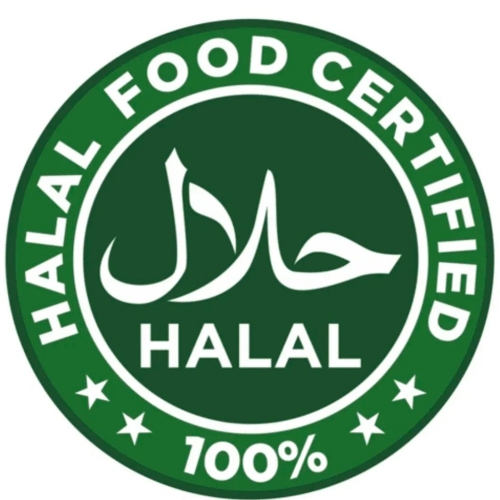
Official Green Logo
Here's something that confused me at first: the halal logo in China doesn't always look like what you expect. There are three main versions you'll encounter:
- Official Green Logo: Features 清真 (Qingzhen) in Chinese characters, sometimes with Arabic script حلال, inside a green circular or rectangular frame.
- Chinese-Only Version: Simply the characters 清真 in green or white against a contrasting background.
- Arabic-Chinese Mixed: The Arabic حلال prominently displayed alongside 清真.
According to the China Islamic Association, all halal restaurants must display a government-issued certificate (清真许可证) at the entrance. This certificate is renewed annually and includes inspections by local mosque clerics to verify compliance.
A word of warning from my experience: I once entered a restaurant in Shenzhen that had 清真 on its sign but also served alcohol and had pork dishes in a "separate section." It wasn't truly halal. If you see ANY pork on the menu or alcohol served, it's not a fully halal establishment—cross-contamination is real.
In China, 清真 (Qingzhen) literally means "pure and true." The government takes halal certification seriously, with fake certifications resulting in heavy fines. This system isn't perfect, but it's far more regulated than in many other countries I've visited.
How to Know If Food Is Halal in China: My 5-Step Verification System
My biggest mistake in China? Trusting a restaurant that had '清真' in the name but still served pork in a "separate section." I learned the hard way that you need to VERIFY, not just assume. Here's my foolproof method:
Step 1: Check for the Official Certificate
Look for a green logo with 清真 characters and a paper certificate on the wall (清真许可证) issued by the local ethnic affairs bureau. The certificate should have a current date and official stamp. Check the list of certified restaurants in the area using specialized Halal dining platforms like "Halal Trip" to reduce the risk of making a wrong choice.
Red flags: Printed paper signs (not official laminated certificates), faded or damaged certificates, or no date/stamp visible. If you see these, politely ask: "这个是今年的吗?" (Is this from this year?). If they hesitate, walk away—there are plenty of verified halal restaurants.
Step 2: Scan the Menu for Pork
Critical rule: If a restaurant has ANY pork dishes on the menu—even in a separate section—it's not fully halal due to cross-contamination risks.
Watch for these characters: 猪肉 (pork), 火腿 (ham), 腊肉 (bacon), 香肠 (sausage). At a supposed "halal" restaurant in Hangzhou, I spotted 火腿炒饭 (ham fried rice) on page 3 of the menu. I immediately left and found a proper halal place two blocks away.
Step 3: Ask About Cooking Wine (料酒)
Many Chinese dishes use 料酒 (liàojiǔ), cooking wine with 10-15% alcohol. Even some halal restaurants use it by default. When ordering, say: "不要放料酒" (Don't add cooking wine). Say this BEFORE they cook, not after.
If they insist wine is necessary, ask for 炒菜 (stir-fried style) or 清炖 (clear stew)—these methods don't typically need wine.
Step 4: Observe Who's Eating There
The best indicator? Muslim Chinese families eating there. If you see Hui men wearing white caps (礼拜帽) or Uyghur families, it's likely authentic. Chinese Muslims take halal seriously—they won't risk eating at questionable places.
Step 5: Trust Your Gut
If something feels off—the owner seems defensive about showing the kitchen, there's alcohol prominently displayed, or the staff doesn't understand what "qingzhen" means—leave. Don't compromise. There are hundreds of verified halal restaurants in every major city.
Are KFC and McDonald's Halal in China?
The question every Muslim traveler asks me: "Can I eat at KFC in China?" Here's the honest answer, and it's complicated.
KFC - Mostly NOT Halal ❌
KFC China does NOT serve halal chicken at regular locations. Their supply chain uses non-halal certified poultry.
The EXCEPTION: In Xinjiang province, some KFC branches ARE halal. Look for a green 清真 sign at the entrance, Uyghur staff, and a visible glass partition showing a separate kitchen. I verified two locations: Urumqi People's Square KFC and Kashgar Old City KFC.
Safe vegetarian options at non-halal KFC: corn cups (definitely safe), mashed potatoes (ask if they use butter or vegetable oil), and french fries (cooked in a separate fryer).
My verdict: I skip KFC outside Xinjiang. Too risky, and Chinese halal food is way better anyway!
McDonald's - Similar Story 🟡
Same situation as KFC—not halal certified, with rare exceptions in Muslim-majority areas. Vegetarian options include apple slices and hash browns (ask about cooking oil).
Better alternative: Instead of McDonald's, try 老马家 (Lao Ma Jia) or any Lanzhou noodle shop. Same price, better taste, guaranteed halal.
Starbucks - Safe for Drinks, Risky for Food ☕
All coffee and tea drinks are safe (unless you request additions). However, avoid sandwiches (may contain ham or bacon) and most pastries (uncertain ingredients).
I use Starbucks for coffee and snacks but eat real meals at halal restaurants. It's a good middle ground when traveling.
Emergency Backup Plans When Halal Food Is Nowhere to Be Found
My worst moment in China: stranded in a small town (Zhangjiajie) at 9 PM, NO halal restaurants in sight. Here's how I survived:
Strategy 1: Find the Nearest Mosque 🕌
Open Baidu Maps (百度地图), search "清真寺" (mosque), and walk there. Even small towns with 500+ Muslims have a mosque. Within 500 meters, there's usually a small eatery or noodle shop.
In Zhangjiajie, the mosque caretaker walked me to his cousin's restaurant (not listed online). Best 羊肉汤 (lamb soup) I had!
Strategy 2: Vegetarian Restaurants
Buddhist vegetarian restaurants use NO meat, eggs, onions, or garlic. While not halal-certified, they're completely meat-free. Search "素食餐厅" on Dianping.
Chain brands include 大蔬无界 (Dashu Wujie) and 枣子树 (Zaozishu). Safe dishes: 炒时蔬 (stir-fried vegetables), 豆腐汤 (tofu soup), 素炒饭 (vegetable fried rice).
Warning: Some use cooking wine! Ask: "有酒吗?" (Do you use alcohol?)
Strategy 3: Supermarket Shopping
Chinese supermarkets stock halal-certified brands. Look for 伊赛 (Yisai) beef and 凤祥 (Fengxiang) chicken with green 清真 labels. Buy instant noodles (统一 Tongyi brand, beef flavor), rice, and vegetables. I spent ¥50 on groceries and made three meals in my Airbnb kitchen—way cheaper than restaurants!
Strategy 4: Hotel Room Cooking
Book Airbnb apartments with kitchens (same price as hotels). Look for 清真超市 (halal supermarket) near mosques to buy ingredients.
Strategy 5: International Chain Compromises
Last resort: Subway's Veggie Delite sandwich (confirm no mayo), Pizza Hut's Margherita pizza, or fresh fruit from street vendors. I only use chains when desperate—Chinese halal food is better in every way.
Frequently Asked Questions About Halal Food in China
Q: What part of China has the most Muslims?
Xinjiang has the largest Muslim population, about 12 million, making it a key region for Halal Food in China. Ningxia follows with 2.5 million Muslims, and Gansu with 1.2 million. For travelers, Shaanxi (especially Xi’an) provides the best balance of accessibility, Muslim culture, and tourist infrastructure. These areas are ideal for those seeking the true taste of Halal Food in China.
Q: Is all Chinese food halal?
No, not all Chinese food is halal. Many traditional dishes contain pork or cooking wine, but Halal Food in China has a long-established tradition through Hui and Uyghur cuisines. Major cities such as Beijing, Xi’an, and Urumqi have verified halal restaurants marked with the “清真” sign. Always check certification and avoid menus featuring alcohol or pork.
Q: Can I survive on vegetarian food if I can't find halal?
Yes, you can, but carefully. Some vegetarian dishes still use non-halal ingredients like oyster sauce or lard. Your safest choice is Buddhist vegetarian restaurants (素食餐厅) that strictly avoid meat and alcohol. Remember, Halal Food in China often appears in unexpected corners, so explore patiently while using apps like Dianping to locate authentic spots.
Q: Is it offensive to ask if food is halal?
Not at all. Most locals appreciate your respect for dietary rules. When asking about Halal Food in China, simply say “我是穆斯林” (I am Muslim), and staff will often guide you to safe options or nearby halal eateries. You’ll find that Halal Food in China is part of a proud culinary tradition tied to Muslim communities that have thrived for centuries.
Q: What if I accidentally eat non-halal food?
It happens, especially in places where halal signage is inconsistent. If you realize mid-meal, stop eating, rinse your mouth, and continue with awareness next time. The good news is that Halal Food in China is becoming better certified and labeled, especially in big cities. Use it as a reminder to double-check restaurant certificates and ask before ordering.
Q: Are there halal hotels in China?
Yes, though limited in number. You’ll find halal-friendly hotels near mosques in Xi’an, Urumqi, and Lanzhou. Many display “清真酒店” (halal hotel) or list “halal food available” on booking sites. For travelers seeking full convenience, combining such stays with local Halal Food in China ensures a smoother, worry-free journey.
Q: Can I bring my own food into China?
You can bring packaged snacks or dry goods, but not fresh meat or dairy. Always declare what you carry at customs to avoid fines. Still, exploring local Halal Food in China is far more rewarding. You’ll find halal-certified supermarkets and restaurants in most major cities—stocking up there supports local Muslim businesses and adds authenticity to your travel experience.
Q: What about prayer facilities?
Prayer facilities are available in most large cities, especially around mosques. Airports like Beijing Capital and Shanghai Pudong also provide multi-faith prayer rooms. Combining prayer stops with nearby Halal Food in China makes travel both convenient and spiritually fulfilling. You’ll often find small halal eateries clustered around mosque areas, serving as welcoming community hubs.
Q: Is halal food more expensive in China?
Actually, no. Halal Food in China is usually affordable and widely available. A bowl of Lanzhou noodles costs around ¥15–28, while regular Chinese restaurants might charge ¥30–50. Overall, you’ll find Halal Food in China not only accessible but also budget-friendly, reflecting both its deep cultural roots and everyday presence across the country.
